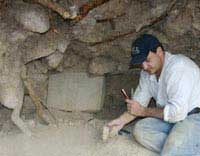 The ancient Egyptians also “gossiped” about a bald queen, royal affairs, missing bodies, same-sex relationships, palace intrigues, and much more.
The ancient Egyptians also “gossiped” about a bald queen, royal affairs, missing bodies, same-sex relationships, palace intrigues, and much more.
Egyptologist Lisa Schwappach-Shirriff, at the Rosicrucian Egyptian Museum in California, USA, which houses one of the largest collections of Egyptian artifacts in North America, recently discovered evidence of gossip in the museum’s archives. The findings indicate that people have always been interested in discussing the private and sensitive matters of others.
“The ancient Egyptians believed that anything written was mysteriously true, so if something was true but not pleasant, it would never be recorded,” Schwappach-Shirriff said.
She added, “This is what makes it fascinating when you uncover details in gossip stories.”
For instance, she explained a text from 5,000 years ago that describes an unnamed king who frequently visited the home of one of his generals at night. The writing repeatedly states that “there was no lady in that house“, suggesting that the king engaged in same-sex relations.
“Does that mean the ancient Egyptians opposed same-sex relationships? Not necessarily,” Schwappach-Shirriff remarked. “The issue might be that the general failed in his duty to produce an heir for the dynasty.”
Andre Dollinger, another Egyptologist who has published extensively on the cultural history of Egypt, also believes that Egyptians often gossiped about royal figures who frequently held parties. “A limestone carving shows a king with a bushy beard, looking more disheveled than acceptable,” Dollinger said.
 |
|
Queen Hatshepsut |
Schwappach-Shirriff noted that a more visual form of gossip was discovered near the temple of Queen Hatshepsut. This lady declared herself king and had an intimate relationship with her advisor named Senenmut.
“How intimate it was remains a mystery, but clearly the builders of the temple thought it was quite close,” she said. “A wall painting depicts the female king in a very relaxed pose with someone who is not of royal blood. Since it was found in the resting area at the construction site, you can imagine how they might have giggled together during their breaks.”
Written records and other evidence suggest that tomb robbers often lost bodies and failed to report their mistakes. For example, the tomb of Queen Hetepheres was discovered intact but without a body. It is possible her remains were lost, but no one wanted to report it to the king.
Although very few documents about the royal harem of ancient Egypt have survived, records indicate that the king’s wives often secretly discussed how to place their children on the throne. In a dark plot, Ramses III was murdered by his wives, who were later accused by workers who overheard the scheme.
Schwappach-Shirriff commented, “People have always gossiped about what interests them, both in ancient times and today. One of the best ways to understand what someone is really like, and what behavior is considered acceptable, is to listen to their gossip stories.”
Minh Thi (according to Discovery)





















































